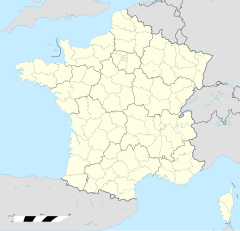Château de Brandon
This article needs additional citations for verification. (July 2015) |
| Château de Brandon | |
|---|---|
 Château de Brandon | |
| Coordinates | 46°51′01″N 4°28′53″E / 46.85028°N 4.48139°E |
| Built | 12th century and 18th century |
| Original use | Castle |
| Current use | Museum |
| Owner | Masin family |
| Website | http://www.chateau-de-brandon.com |
| Designated | 1975 |
The Château de Brandon is a castle in the commune of Saint-Pierre-de-Varennes in the Saône-et-Loire département of France.[1]
History
[edit]The castle was built on the site of Gallo-Roman camp.[2] Although it undoubtedly existed before, there is no documentary evidence before the 13th century when a charter shows it as a purely defensive site under the Duchy of Burgundy,[3] which it remained until the 15th century.[2]
It is an excellent example of military architecture with upper and lower walled courtyards, 12th century round walk and a 13th-century drawbridge tower. The main building was modified during the reign of King Louis XIII where the fortress was turned into a 17th-century residence.[2]
Description
[edit]The castle stands on top of a hill. The buildings are distributed around an irregular shaped enceinte divided into two by a wall separating the farmyard of the lower courtyard from the residential court. The latter, of lengthened rectangular form, is flanked in the north-western and north-eastern corners by square towers. A wing at right angles occupies the east side; it is connected by a section of wall to a third square tower. The courtyard is completed by the agricultural buildings and a stable. A gate tower located at the south-western corner gives access to this area.
History
[edit]
- Ancient Rome : military post at junction of routes.
- 13th century :probable existence of a strengthened tower owned successively by the lords of Brandon then by captains who hold it in the name of the dukes of Burgundy.
- 1365 : the tower is entrusted to Robert d' Essertenne who becomes its hereditary lord.
- 14th century : the duke Philippe II of Burgundy raises the stronghold to a barony to the advantage of Philippe de la Roche, grandson of the preceding.
- 1453 : castle sold.
- 1528 : after complex successions within the Lugny family, the castle is acquired by Hugues-Bernard de Montessus
- 1633 : property seized by Charles de Montessus, great-grandson of the preceding.
- 1638 : sold to Alphonse de Chaumelis.
- 1653 : death of Alphonse de Chaumelis who leaves two daughters – Jeanne et Huguette – under the supervision of their uncle, Jean-Baptiste de Chaumelis.
- 1670 : Huguette de Chaumelis, daughter of Alphonse, marries Claude de la Coste, inherits Brandon at the conclusion of a fight against her uncle who had tried to despoil it.
- 1729 : attack on the castle by the local population organised by Eugene, son of Huguette, who seeks to dispossess his mother.
- 1729 : Jean-Baptiste, Huguette's other son, inherits the property at the death of his mother.
- 18th century : childless, Jean-Baptiste bequeaths the castle to Jeanne-Huguette de la Coste, his niece, wife of the marquis Jacques de Beaurepaire ; the main building, probably built by Chaumelis, is abandoned to the farmers.
- End of the 18th century : a Beaurepaire daughter marries Louis Furrier de Cléry who, because of a spendthrift life, has to sell Brandon.
- 1826 : the property passes to Nicolas Tripier, a lawyer, deputy, and peer of France.
- 19th century : through the daughter of the preceding, Antoine Mala becomes owner of the castle.
- Around 1900 : important restoration works carried out by the granddaughter of Nicolas Tripier, widow of Ferdinand de Jouvencel.
- 1922 : on the death of Mme de Jouvencel, the vicomte de Masin, her grandson, inherits the estate. The castle still belongs to this family.
Today
[edit]The castle is privately owned. It has been listed since 1975 as a monument historique on the supplementary inventory of the French Ministry of Culture.[1] It is a family home and open to the public in July and August.[2]
See also
[edit]References
[edit]- ^ a b Base Mérimée: Château de Brandon, Ministère français de la Culture. (in French)
- ^ a b c d Château de Brandon website: BRANDON Castle Archived 2011-07-08 at the Wayback Machine
- ^ a b Château de Brandon website: BRANDON's History Archived 2015-07-11 at the Wayback Machine
- ^ Eugène Fyot : "Le château et les seigneurs de Brandon" in Mémoires de la Société éduenne vol 28 (1899), pp 1-104.
Bibliography
[edit]- Françoise Vignier (ed), 1985: Le Guide des Châteaux de France: 71 Saône-et-Loire. Paris: Editions Hermé (in French)
- Eugène Fyot : "Le château et les seigneurs de Brandon" in Mémoires de la Société éduenne vol 28 (1899), pp 1–104. (in French)
- Eugène Fyot : Le château et les seigneurs de Brandon, Autun, Imprimerie et Librairie Dejussieu, 1900. (in French)
External links
[edit]- Base Mérimée: Château de Brandon, Ministère français de la Culture. (in French)
- Official site, in English

